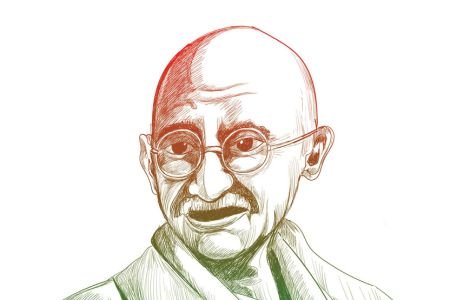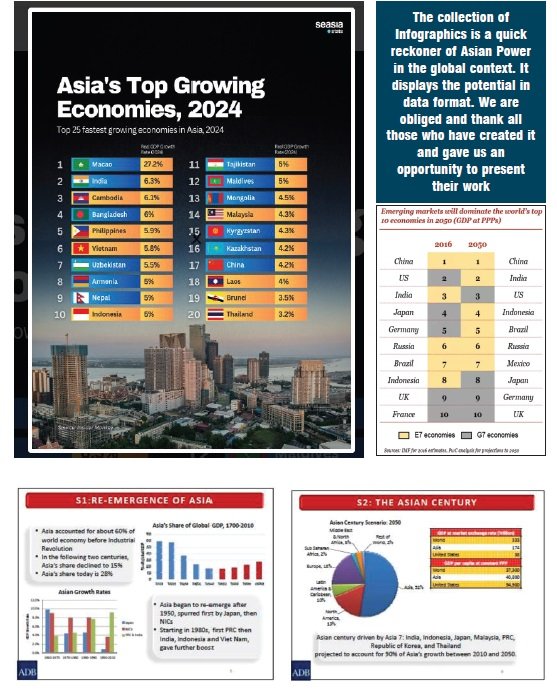Contributing to Global Politics and Economics
India gained its Independence in 1947 and, over the next 75 years, made a mark in global politics and economics. It is all set to take a podium stand in the race to become a big player in economic growth.
Much of what India is today and will be is influenced by the teachings of one of the greatest global leaders and statesmen from India—Mohandas Karamchand Gandhi or Mahatma Gandhi.
India learned to develop its social welfare policies that are globally relevant even today from its vision and mission. Some argue that India’s approach has changed over the years. But that, too, is based on his teaching– “I do not want my house to be walled in on all sides and my windows to be stuffed. I want the culture of all lands to be blown about my house as freely as possible.” – Mahatma Gandhi, Young India, June 1, 1921. The Indian diaspora is a perfect example of India’s contribution to this thought of Gandhi in Asia and worldwide.

“I will give you a talisman. Whenever you are in doubt or when the self becomes too much with you, apply the following test. Recall the face of the poorest and the weakest man [woman] whom you may have seen, and ask yourself if the step you contemplate is going to be of any use to him [her]. Will he [she] gain anything by it? Will it restore him [her] to control over his [her] own life and destiny? In other words, will it lead to swaraj [freedom] for the hungry and spiritually starving millions? Then you will find your doubts and yourself melting away.”
—Mahatma Gandhi
India’s deepening engagement with the United Nations is based on its steadfast commitment to multilateralism and dialogue as the key to achieving shared goals and addressing common challenges faced by the global community, including those related to peacebuilding and peacekeeping, sustainable development, poverty eradication, environment, climate change, terrorism, disarmament, human rights, health and pandemics, migration, cyber security, space and frontier technologies like Artificial Intelligence, comprehensive reform of the United Nations, including the reform of the Security Council, among others. As a founding member of the United Nations, India strongly supports the purposes and principles of the UN and has made significant contributions to implementing the goals of the Charter, and the evolution of the UN’s specialized programmes and agencies.


The faith in the United Nations and the norms of international relations fostered by India remain the most efficacious means for tackling today’s global challenges. India is steadfast in working with the Committee of Nations in the spirit of multilateralism to achieve comprehensive and equitable solutions to all our problems, including development and poverty eradication, climate change, terrorism, piracy, disarmament, peacebuilding and peacekeeping, and human rights.
As a developing nation, it has consistently reiterated its support for the multilateral trading system and the central ity of the WTO as the cornerstone of a rule-based, open, transparent, non-discriminatory, and inclusive multilateral trading system, with development at the core of its agenda. India has underlined that the reform of institutions such as the IMF remains an important goal in better addressing the interests of developing nations.
India actively contributed to the debates and deliberations that led to adopting the Global Compact on Safe, Orderly and Regular Migration. India believes that safe, orderly, and regular migration will help achieve Sustainable Development Goals (SDGs), and achieving SDGs will ensure that migration will be out of choice and not out of compulsion. A country with a history of the evolution of women’s emancipation over the years, India has partnered with UN Women since its inception to address critical issues concerning gender equality and women’s empowerment in national and global contexts.
As a country that was colonized, India has always been at the forefront of the struggle against colonialism and apartheid since its Independence seven decades ago. India believes that pursuing a pragmatic approach towards Decolonization would lead to the fulfilment of the legitimate wishes of the people of any country. India, in addition, has forged strong bilateral relations and economic cooperation with Asian countries. It has ensured that the negotiation with smaller economies is on par as an Independent nation, and with more powerful nations, it has reminded of its prowess. Such an approach has been respected globally.
One school of thought argues that India opened its market under pressure from the World Bank and the IMF. In contrast, another claims it was a natural progression of a country that kept introspecting, assessing its present, and planning its future. Whatever it may be, India has proved that its decisions are based on sound policy and visionary foundation. Over the years, Asian countries and the world have had to accept it, giving it a fair reason to take a responsible position and be a decision-maker in Asian and global politics and economics.
